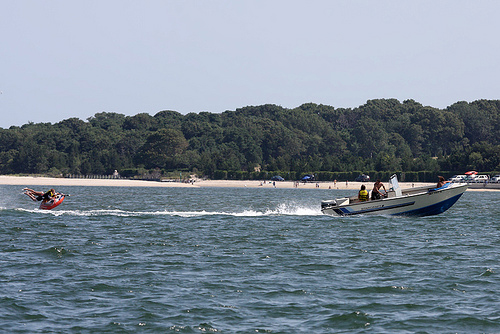New state regulations will require boaters to pass safety course

A new state law will require all New York boaters to take a safety course by January 2025, state officials announced last week.
Brianna’s Law, named after Brianna Lieneck, an 11-year-old Deer Park resident who was killed in a 2005 boating accident near Fire Island, will require that all operators of motorized watercrafts complete a state-approved, eight-hour course on boater safety, according to a state press release.
The measure, which goes into effect January 2020, is staggered based on the age of the boat operator. All boaters born on or after Jan. 1, 1993, must complete a safety course to operate a boat beginning in 2020, the press release said. The measure extends to all boaters beginning in 2025, regardless of age.
Failure to comply with the new law could result in a fine between $100 and $250, according to the press release.
The law does not apply to operators of sailboats, kayaks, stand-up paddleboards, rowboats or canoes.
Southold Town Police Chief Martin Flatley said the police department supports the educational opportunity for boaters, however, he said they have not yet received information on how the law will be enforced by police. The delay is typical for state legislation brought to the local level, he said.
“We still have not received anything from them as far as law-wise and how it applies to what we will be doing,” he said. “Regardless of what it is, if it’s passing on good information about boating and safety, it’s always good for us as well.”
The Peconic Bay Power Squadron, the local sector of the United States Power Squadron which serves waters on the North and South forks, offers internal boater safety courses to boaters of all ages.
Captain Frederick Smith, an instructor with the local sector who has worked on the water for over 40 years, said he anticipates the law will be administered similarly to traffic stops on highways. In waterways like the Shinnecock Canal in Hampton Bays, bay constables currently conduct boat stops to make sure the proper equipment is on board, he said.
Jeff Strong, owner of Strong’s Marine, who has worked on the water for over 20 years, said increasing boater safety regulations has been gradually advancing and that this is just another step in the right direction.
Mr. Strong said his rental service has mandated new boaters receive at least four hours of on-boat lessons with a Strong’s captain. He said he believes the law could help prevent future incidents, but it’s not going to stop all accidents from happening.
“So I think it will be a help, it’s a good thing, but it’s not a silver bullet,” he said. “People still need common sense, they need to take responsibility, and they need to learn not just the computer part of the class — it’s great to have on-boat experience and training.”
According to the state’s 2018 Recreational Boating Report, there were 17 fatal boating accidents last year, and there were 203 total accidents statewide.
A contributing factor of boating accidents and fatalities is related to alcohol use, Sea Tow Foundation board of directors president Kristen Frohnhoefer said.
Alcohol was blamed in 28 crashes, driver inattention was blamed in 86 crashes and speed was the cause in 23 crashes, according to the state’s 2018 boating report.
Ms. Frohnhoefer recommends boaters have at least one “sober skipper on board” to be responsible for boaters and passengers.
A previous state law approved in September 2013 required the course be administered to boaters born after May 1, 1996, and must hold a boater safety certificate. Boaters can get their certification through State Parks-approved courses either online or in classrooms.
Mr. Smith said he supports the law, but would be more supportive if the exam was exclusively available in-person.
“It’s just difficult for New York State to deal with [a proctored exam] so they’ve made it easier to do an unproctored course online,” he said. “Anyone can take it for you.”
Diane Sherman of Riverhead has lived aboard a boat on Peconic River for almost 17 years. A sailor at heart, she said that prior to owning a boat, she felt it was important to take a safety course.
“There’s no yellow line, there’s no stop lights,” she said. “Today’s boater is not as conscious of where they are, who’s around them.”
There are nearly 439,000 registered powerboats in the state, according to the 2018 state Recreational Boating Report.









